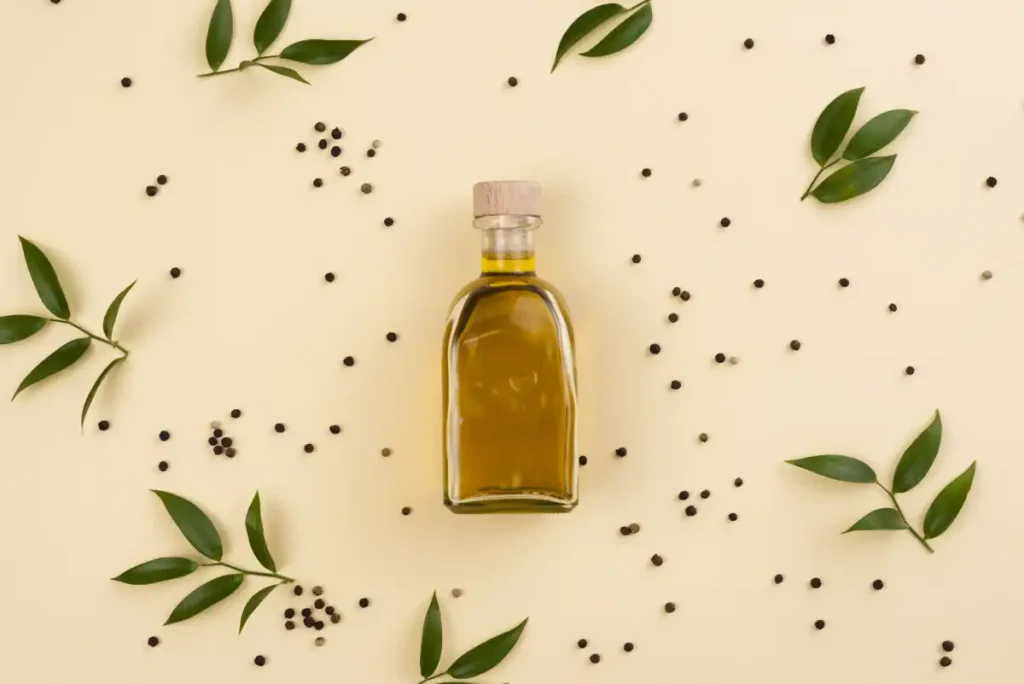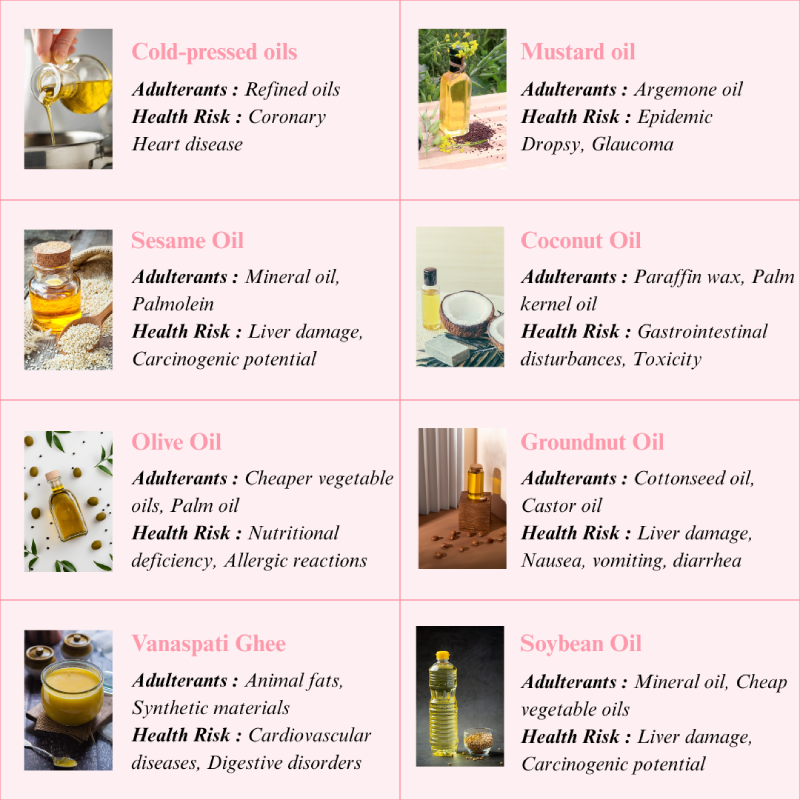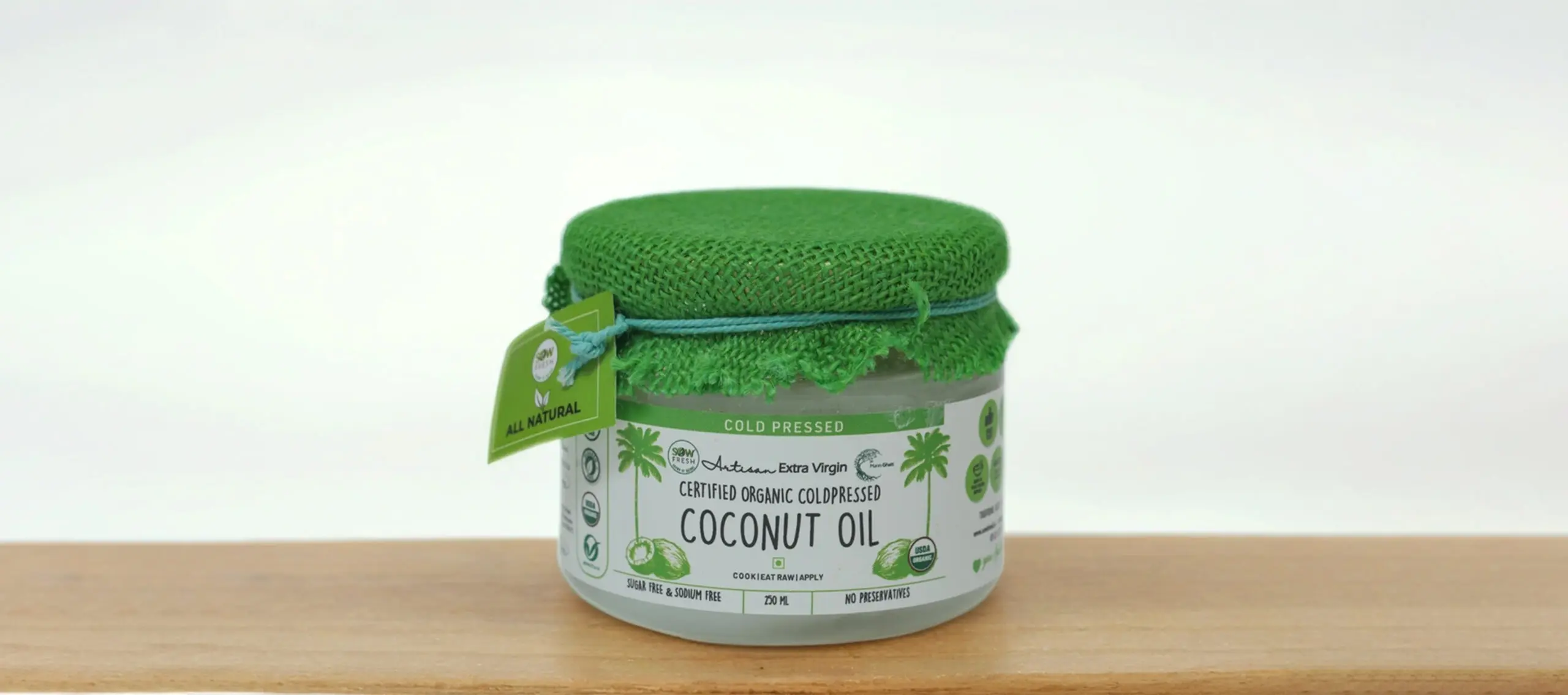Cold-Pressed Oil: 6 Powerful Reasons to Switch Today

Table of Contents
Introduction
When it comes to choosing the right cooking oil, you might ask: Why do I need cold-pressed oils? Choosing the right oil for Indian cooking can be tricky with all the frying, tadkas, and bold flavors we love. Traditional picks like groundnut and mustard oil do a great job, but with growing health awareness, many are turning to healthier options, like cold-pressed oils. Unlike refined oils, they offer both health benefits and a rich taste.
The answer lies in how the oil is extracted, what nutrients it retains, and how it impacts your health long-term. In this post we’re going to explore cold-pressed oil in depth; what it is, why it’s worth considering, how to use it wisely, and what mistakes to avoid.
Let’s begin by clarifying exactly what “cold-pressed” means and then dive into the direct answers to your questions.
What are Cold-pressed oils?
Kachi Ghani, or Cold-Pressed, is a popular method of pressing the oil grains with great force, extracting oil and preserving the natural.
Cold-pressed oils are extracted from seeds or nuts by mechanical pressing, without high heat or chemical solvents. The term “cold-pressed” generally means the temperature is kept low (often under ~49 °C or so) to preserve the natural nutrients, flavour, and aroma.
Because the process is gentler and avoids chemical extraction, cold-pressed oils tend to retain more bioactive compounds such as phenolics, sterols, tocopherols (vitamin E variants), and carotenoids.
In contrast, many “refined” oils undergo high heat, chemical solvents, bleaching, deodorizing which may reduce nutrient content and alter flavour.
So if you’re wondering “why do I need cold-pressed oils?” part of the answer lies here: you’re choosing an oil extraction method that better preserves beneficial nutrients, flavour and possibly health effects.
Why Choose Cold-Pressed Oils?
Here we answer your question directly: you need cold-pressed oils because they offer several health, sensory, and quality advantages over many conventional oils. Let’s break them down:
1. Better Nutrient Retention
Cold-pressed oils retain higher levels of antioxidants (polyphenols, tocols, sterols) compared to refined oils. For example, research shows that cold-pressed oils have more of these minor but bioactive compounds thanks to minimal processing.
These compounds contribute to reducing oxidative stress, inflammation, and may protect against chronic disease.
2. Healthier Fatty Acid Profile & Heart Health
While the overall fat content is similar between oils, the quality of fats (monounsaturated, polyunsaturated) and the presence of beneficial compounds matter. For example, a cold-pressed olive oil is rich in oleic acid and antioxidants, which may reduce LDL (“bad”) cholesterol and support heart health.
Other seed-derived cold-pressed oils have been shown to influence blood lipid profiles, insulin sensitivity or glycemic control.
3. Anti-Inflammatory & Antioxidant Effects
One of the core reasons for using cold-pressed oils is their anti-inflammatory potential. For example, the high content of plant compounds such as oleocanthal (in olive oil) or other phenolics can act similarly to mild anti-inflammatory agents.
Reduction of inflammation is key to preventing various chronic conditions (heart disease, diabetes, neurodegenerative diseases). So using oils that help rather than hinder is wise.
4. Improved Sensory Quality & Flavor
Cold-pressed oils often have richer flavours, aromas and natural colour, because the processing retains more plant-derived volatile compounds. If you enjoy cooking and eating, that difference in flavour can make a big difference, turning your meals from “just edible” to “tasty and satisfying”.
5. Better for Nutrient Absorption
Healthy fats help absorb fat-soluble vitamins (A, D, E, K) and other nutrients. By using a nutrient-rich oil you’re not just providing calories; you’re improving the whole nutrient absorption environment.
6. Cleaner / More Natural Processing
Since cold-pressing avoids solvents and heavy refining, the oils tend to be “cleaner” in the sense of fewer processing additives, fewer exposed compounds to degrade during high heat extraction. For consumers who prefer more natural food processing, that is a meaningful benefit.
Refined vs. Cold-Pressed Oils: Key Differences and Common Adulterants
| Feature | Cold-Pressed Oil | Refined Oil |
| Extraction Method | Mechanical pressing at low temperatures (typically below 50°C). | Involves using heat and chemical solvents. |
| Nutrient Value | Retains valuable nutrients such as antioxidants, vitamins (e.g., vitamin E), and polyphenols. | Experiences a loss of micronutrients due to high heat and chemical processing. |
| Flavor & Aroma | Preserves the natural flavor and aroma of the source seed or nut. | Has a neutral taste and odor due to deodorization. |
| Appearance | Typically darker, with sediment present. | Clear and uniform in appearance. |
| Shelf Life | Generally has a shorter shelf life due to the absence of preservatives. | Offers a longer shelf life due to refining processes and added preservatives. |
| Cooking Suitability | Best suited for low to medium-heat cooking and salad dressings. | Suitable for high-heat cooking methods, such as deep frying. |
| Cost | More expensive due to minimal processing. | Economical and mass-produced. |
Common Adulteration and Health Risks

Choosing & Using Cold-Pressed Oils : Practical Tips
Here are actionable tips to help you make the most of cold-pressed oils in your diet:
Tip 1: Match the Oil to the Use
~ Use robust flavour oils (e.g., cold-pressed sesame, mustard, groundnut) for dressings, finishing dishes, or low/medium heat cooking.
~ For high-heat cooking, select a cold-pressed oil with higher stability (e.g., from high-oleic seeds) or use as a finishing oil instead.
~ Always check smoke point guidelines (many cold-pressed oils will list them) and avoid overheating.
Tip 2: Store Properly
~ Keep the bottle in a cool, dark place (away from direct light and heat) because exposure to light/heat/oxygen accelerates oxidation of the fats.
~ Once opened, use within a few months (or follow manufacturer’s recommendation); the fresher the oil, the better the nutrient profile and flavour.
~ Consider smaller bottle sizes if you use it occasionally, to ensure freshness.
Tip 3: Use It Smartly to Replace, Not Just Add
~ Instead of just adding the cold-pressed oil on top of what you already use, consider replacing a refined oil with a high-quality cold-pressed version. That way you lower less-healthy fats and upgrade nutrient quality.
~ For example: Replace 1 tbsp (15 ml) of refined oil with 1 tbsp of a cold-pressed oil in your salad dressings or sauté-ing.
Tip 4: Pay Attention to Portion & Calories
~ Oils are calorie-dense (about 120 kcal per tablespoon). Even a “healthy” oil can contribute to excess calories if used liberally. Use moderation and eyeball portion sizes.
~ Combining cold-pressed oil with a balanced diet (whole grains, legumes, vegetables) maximises benefits.
Tip 5: Rotate Oils & Match Flavour
~ Different cold-pressed oils bring different fatty acid profiles and flavour notes (sesame is nutty, mustard strong, groundnut mild). Use a rotation for variety and maximise different nutrients.
~ Use an oil that suits your cuisine: e.g., Indian cooking might benefit from cold-pressed mustard seed oil or sesame oil; Mediterranean uses olive oil.
Tip 6: Be Mindful of Cupboard/Label Claims
~ Some oils labelled “cold-pressed” may have been mixed with refined oil, or processed at higher temperatures than ideal. Look for transparent info, batch/freshness date, seed/farming origin and ideally certifications. Research calls out adulteration as a concern.
~ If the oil smells rancid, tastes off, or the bottle is very old; avoid it.
Mistakes to Avoid When Using Cold-Pressed Oils
To get the full benefit of cold-pressed oils, avoid the following common pitfalls:
Mistake 1: Overheating the oil (above its smoke point) which can degrade nutrients and form harmful compounds. Reserve some cold-pressed oils for dressings or finishing if heat is too high.
Mistake 2: Using a large bottle and storing it too long, the oil may oxidise, lose flavour, and lose nutritional value.
Mistake 3: Thinking “cold-pressed = unlimited use” , these are still fats and need moderation. Replacing refined oils is smart, but over-use still adds calories.
Mistake 4: Being misled by marketing claims “cold-pressed” alone is not guarantee of high quality. Check origin, processing details, freshness.
Mistake 5: Using one oil exclusively, you miss out on variety of fatty acids and flavour. Rotate.
Mistake 6: Expecting oil to fix all problems it supports health, but diet, lifestyle, exercise, sleep, and overall food quality matter a lot too.
Practical Daily Uses & Recipe Ideas
Here are some ways to incorporate cold-pressed oils into your everyday cooking:
1. Salad dressing: Use cold-pressed groundnut or sesame oil plus lemon juice, herbs, salt & pepper. These oils add flavour and nutrient-rich fats.
2. Finishing oil: After cooking your vegetables or grains, drizzle a teaspoon of cold-pressed avocado or mustard oil to elevate flavour and add healthy fats.
3. Stir-fry (low to medium heat): Use a cold-pressed oil with moderate smoke point, sauté veggies, tofu or paneer, and finish with a cooler sauce so you preserve nutrients.
4. Marinades: Use cold-pressed nut/seed oil in marinades for fish or chicken (or plant-based alternatives) the fats help carry flavours and improve absorption of fat-soluble nutrients.
5. Light sautéing/baking: If you’re baking muffins or sautéing onions at moderate heat, use cold-pressed oils instead of heavier refined oils to upgrade the fat profile.
Pink Tiger-Approved Cold-Pressed Oil
With Pink Tiger, we spotlight health-focused products and conduct thorough Independent third party lab tests to ensure the highest ingredient quality.
Why? Because purity matters.
Adulteration is an increasing concern, particularly with everyday essentials like oils, where harmful additives and contamination can often go unnoticed. Just because a label claims “pure” doesn’t mean it’s actually true; labels can be misleading. That’s why we conduct tests to reveal the truth and provide you with reliable products.
If you’re in the market for cold-pressed oil, opt for one that upholds the highest standards. Look for the Pink Tiger stamp, a symbol of quality you can trust. Explore our carefully curated selection here
Final Thoughts
In short: if you’re asking “why do I need cold-pressed oils?”, the answer is that they offer a meaningful upgrade in nutrient quality, flavour, and health-supportive properties compared to many conventional refined oils. They’re not a magic bullet, but they are a smart choice within a balanced diet.
By selecting authentic cold-pressed oils, using them appropriately (in place of refined oils rather than simply adding them on top), storing them well, using moderation, and rotating varieties, you can harness real benefits: better heart health, stronger nutrient absorption, less inflammation, richer flavour and a more wholesome cooking experience.
To make your switch easier: start by replacing one regularly used oil (for example your everyday cooking oil) with a cold-pressed version. Observe the difference in taste, aroma, your satisfaction after meals, and how your cooking feels. Over time you can expand to include one more variety and rotate your oils for diversity.
With conscious choices like this, you’re not just changing an ingredient you’re upgrading your kitchen, your meals, and your health.
To know more about which cooking oil is best for your Kitchen, Read our blog
Frequently Asked Questions (FAQs)
1. Is cold-pressed oil always better than refined oil?
Generally yes for nutrient preservation and flavour, but “better” depends on how you use it, the smoke point needed, and whether the label is genuine. For high-heat deep-frying you might need to consider the smoke point and stability of the oil (some cold-pressed oils have lower heat tolerance).
2. Can I use cold-pressed oils for all cooking (frying, sautéing, baking)?
Yes, but with care. Some cold-pressed oils have lower smoke points and may degrade if overheated, which reduces their beneficial compounds and may create harmful by-products. For high-temperature cooking, you might choose a cold-pressed oil with a higher smoke point or use it for finishing / dressings rather than deep-frying.
3. Are there any risks of cold-pressed oils?
As with any oil, remember they are calorie-dense, using too much can contribute to excess calories. Also some cold-pressed oils might oxidise if stored improperly (light, heat, air exposure) reducing benefits or even forming undesirable compounds. And some may have lower smoke point so risk of overheating. Proper handling and moderation is key.
4. Is cold-pressed oil really healthier?
Yes. Cold-pressed oils retain higher levels of vitamin E, polyphenols, phytosterols, and essential fatty acids like omega-3 and omega-9, all of which support cardiovascular and cellular health. These natural antioxidants help neutralize free radicals, reduce inflammation, and may protect against chronic conditions such as heart disease or diabetes. They also nourish skin and hair from within. Compared to refined oils, cold-pressed variants provide cleaner fats with more bioactive compounds intact. When used in moderation as part of a balanced diet, they can enhance overall wellness and improve nutrient absorption from food.
5. What are the best cold-pressed oils for Indian cooking?
Indian cooking is diverse, and the right cold-pressed oil depends on your cuisine style. Cold-pressed groundnut oil works beautifully for stir-frying and deep-frying due to its high smoke point. Sesame oil adds nutty richness to South Indian dishes and chutneys. Mustard oil brings authentic flavour to North and East Indian curries and pickles, while coconut oil enhances coastal and South Indian recipes. For salads or Western-inspired dishes, olive oil are excellent choices. Using region-appropriate cold-pressed oils not only complements the taste of local foods but also aligns with traditional health practices.
Disclaimer : This content is for informational purposes only and is not a substitute for professional medical advice, diagnosis, or treatment. Always consult a qualified healthcare provider for any questions or concerns regarding your health.
References :
1. Abdalla, S., Aroua, M. K., & Gew, L. T. (2024, October 25). A Comprehensive Review of Plant-Based Cosmetic Oils (Virgin Coconut Oil, Olive Oil, Argan Oil, and Jojoba Oil): Chemical and Biological Properties and Their Cosmeceutical Applications. ACS Omega, 9(44), 44019–44032. https://doi.org/10.1021/acsomega.4c04277
2. Bortolomeazzi, R., Cordaro, F., Pizzale, L., & Conte, L. S. (2003, March 7). Presence of Phytosterol Oxides in Crude Vegetable Oils and Their Fate during Refining. Journal of Agricultural and Food Chemistry, 51(8), 2394–2401. https://doi.org/10.1021/jf026063d
3. Choon, Ianne, Umair, Mahmud, & Liew. (2021). Edible oils adulteration: A review on regulatory compliance and its detection technologies. https://www.jstage.jst.go.jp/article/jos/70/10/70_ess21109/_article/-char/ja/
4. Lin, Y., Knol, D., Valk, I., van Andel, V., Friedrichs, S., Lütjohann, D., Hrncirik, K., & Trautwein, E. A. (2017, October). Thermal stability of plant sterols and formation of their oxidation products in vegetable oils and margarines upon controlled heating. Chemistry and Physics of Lipids, 207, 99–107. https://doi.org/10.1016/j.chemphyslip.2017.01.007
5. Michalak, M., Błońska-Sikora, E., Dobros, N., Spałek, O., Zielińska, A., & Paradowska, K. (2024, September 6). Bioactive Compounds, Antioxidant Properties, and Cosmetic Applications of Selected Cold-Pressed Plant Oils From Seeds. Cosmetics. https://www.mdpi.com/2079-9284/11/5/153
6. Rabiej-Kozioł, D., Momot-Ruppert, M., Stawicka, B., & Szydłowska-Czerniak, A. (2023, July 18). Health Benefits, Antioxidant Activity, and Sensory Attributes of Selected Cold-Pressed Oils. Molecules. https://www.mdpi.com/1420-3049/28/14/5484
7. V., S., & Prasad. (2023). Extraction of oil from oilseeds by cold pressing: A review. https://www.researchgate.net/profile/Sugreev-Shinde/publication/371608331_Extraction_of_oil_from_oilseeds_by_cold_pressing_A_review/links/648c2c528de7ed28ba2ffca6/Extraction-of-oil-from-oilseeds-by-cold-pressing-A-review.pdf
8. Vezirka, Vesna, & Elena. (2016) Differences in chemical parameters of cold pressed oil and refined cooking oil. https://www.academia.edu/download/86608494/MJAS-06-1-_2016_-214-Pavlovska.pdf
9. View of Functional and Nutritional Health Benefit of Cold-pressed Oils. (n.d.). https://saaer.org.in/journals/index.php/jae/article/view/275/199





